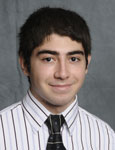
Marc Khoury, a graduating senior CSE student, has been awarded a 2012 Churchill Scholar Fellowship from the Winston Churchill Foundation. Annually there are only fourteen scholarships given to graduating seniors and recent graduates demonstrating exceptional academic talent, outstanding personal qualities, and a capacity to contribute to the advancement of knowledge in the sciences, engineering, or mathematics. The scholarship supports one year of graduate study in a relevant field at the University of Cambridge in the United Kingdom. Marc is only the third OSU student to attain this recognition and the first from CSE.
Almost since his first day in CSE, Marc has been an exceptional student with a drive to achieve an outstanding career in academia. A member of the Honors Collegium, he began conducting research as a freshman under the guidance of Dr. Rephael Wenger, studying isosurface meshes, a tool for data visualization. As a sophomore, this work resulted in his first publication and a national presentation at the leading conference in computer visualization. Marc has also gained experience with mathematics research, studying topology through an NSF REU at Ohio Wesleyan University in 2010. This past summer, Marc undertook a high profile internship in New Jersey with AT&T Labs in their information visualization group, working on new techniques for generating large graph layouts. Following this, he spent fall quarter with Amazon.com in Seattle as a software development engineering intern in their fraud department. All of these research and industry experiences combine to give Marc a diverse tool set to use in approaching complex topics in computational geometry.
Marc will pursue an MPhil in Advanced Computer Science at Cambridge, where he will conduct research in geometric modeling under Dr. Neil Dodgson. Upon completion of his degree, he plans to return to the United States to begin a PhD program in Computer Science at UC Berkeley or Stanford. Marc's ultimate goal is to become a professor at a major university, teaching students and developing provably good meshing techniques to provide researchers in computational science with an array of high quality meshing tools so that they can easily pursue their research.